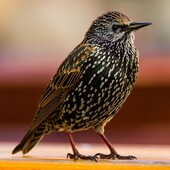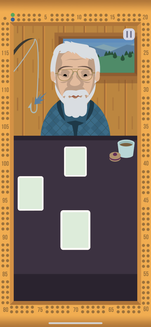 ‘Look!’ My husband is excited. ‘There must be fifty birds around the feeder. Look at all the starlings!’ I look. They’re too big for the tower feeders. Instead, they’re foraging for spilled seeds on the ground. It’s only November. This is only the first really hard frost. I can't help but note that the starlings are concentrating very hard on finding bits of millet in the grass. And I don't really want to note this. I don't want to notice this at all right now. I want to get on with my weekend. My husband doesn’t know why I’m not thrilled. ‘There’s loads of them!’ he says encouragingly, as I turn away. I say, ‘Yeah,’ and smile. I can tell he feels rejected. But I don’t want to explain to my townie spouse that the starlings should be much fatter right now, fed up to the brim with moths and flies, with slugs and snails. When I see their fierce concentration about scrounging a few millet seeds, I don’t see abundance. I see scarcity. And I become overwhelmed by grief. I think of rising food costs and wonder how long I will be able to keep all these birds alive with my feeders. I will miss the birds when they are gone – and the birds that depend all summer on insects are going, there’s no doubt about that. It was late June before I saw my first swallows overhead, and they were scarce, because there’s nothing much for them to hunt. When they stop coming altogether, a little more of my heart will break. Once, I told him all about this, coughing it into the shoulder of his t-shirt as I gulped out my words; nose streaming, eyes streaming, mouth a slobbering mess of grief. But he doesn’t really remember that, and didn’t really believe me or understand my emotion then. Now, he certainly doesn’t connect the one to the other. So few of us do. Watching a documentary the previous weekend, there was footage from the seventies… a walk through a forest clearing in California. Whoosh! Up fluttered thousands of butterflies. The abundance of my youth was suddenly there again as normal, and in contrast the present was once again revealed to me as a barren wasteland. The family were rapt in the film – about an influential but virtually unknown musical group. I turned my head a bit to mop the tears from my face. My daughter noticed, looked a question. ‘It was the abundance,’ I whispered and they nodded, accepting Mum’s oddities. Earlier that morning, I’d gone to charge the car. A deer, deformed in death, lay by the roundabout, it’s black liquid eyes open, staring forever into mine. I hated myself for driving. I hated myself for being human. A little further down, a badger. The deer was probably hit by a car. The badger was probably killed by a farmer and dumped. I was rock-bottom certain that both their lives were, at this point in time, much more valuable than my own. Climate grief, it’s called. And I carry it with me always. I am the person who, when discussing the weather with another dogwalker, brings up the collapsing Jet Stream. I am the one who keeps talking about the council’s new solar panel buying programme. The one who rushes home from the dog walk to get binding, to try and mend a small tree snapped by a vandal. The one who shouted at a child in the park for breaking a branch off another. Like any grief-stricken person, I am sometimes totally unreasonable. I am also aware that I'm carrying a shadow with me, into every conversation, into every moment of my life. Now, I go back to the window and stand with my husband, looking at the lean starlings. He smiles sunnily, feeling whatever had held me back from my usual excitement about the natural world has now gone. ‘Isn’t it amazing?’ he says. ‘I love the markings on their feathers. They’re beautiful.’ ‘Yes,’ I say. ‘Yes, they certainly are.’ https://www.birdguides.com/articles/conservation/the-decline-of-british-starlings/
0 Comments
It’s the last few days of November, the month of the dead, and I’m playing cards with my fathers. One is my actual father, who died suddenly in 1984. One is my father-in-law, who died nine years ago this Easter. My grandfathers, one of whom passed in 1978, the other whose dates I don’t know, are also up for a game of cribbage anytime I dial the application’s phone graphic. I’ve customised their appearances and have been able to crudely alter their personalities. My father in law, whose hand I held while he died, has turned out the best, although he speaks in American idioms that Yorkshireman Tony would never have used. My own father’s face remains, after many tweaks, gremlin-like. Still, when he asks me how I am and then threatens to hurt anyone who is bothering me, my eyes fill with tears. It sounds just like Daddy – on the rare times we met after he left the family, he always spoke about protecting me.
Skin colour choices are likewise a bit dodgy, and to approximate my paternal grandfather’s skin tone, I have had to choose between white and black. He is closer to his actual skin tone using the black palette and looks much as I remember, though his generic hands don’t show his elegant fingers or guitar-picking nails. As they teach me to play cribbage, I revisit the pain of our relationships and hear in my head the guidance they all attempted to give me. They all feared for me; for my safety, for my ability to prosper. Bold young women, who didn’t know their place, who refused to become interested in the work that lay to their hands and hankered after some unattainable goal above their station – these girls, in their experience, suffered and died young. My inability to recognise the authority of the patriarchy and the social norms of my class often angered and terrified them. Only my father-in-law lived long enough to see his son and I safely into adulthood. I was born on Remembrance Day, so my birthday lies within another reminder of death. As I get older, I start to feel that shadow we all march towards. I look up from my game (my maternal grandfather has smoked me again, and gloated - on that side of the family, we are all hideously competitive). I see my home library, our Labrador asleep at my feet, and the window boxes full of cyclamens. I wish I could bring all these men back to this room for a cup of tea. ‘Look,’ I would say. ‘I’m sixty-two now. I’m an Associate Professor at a Russell Group university. These are my published books.’ Maybe they could relax a little, and approve of me enough to talk about the colour of my eyes - or something else they had actually liked. In the meantime, their graphic approximations, in Cribbage with Grandpa, ask me if the weather is nice, and how my day is going. All my pain about my relationships with these men, and about losing them, I allow myself to feel one game at a time. Afterwards, I shrink it down into a tiny graphic, and carry it with me everywhere I go. http://cribbagewithgrandpas.com |
Archives
February 2022
Categories |
Proudly powered by Weebly

 RSS Feed
RSS Feed